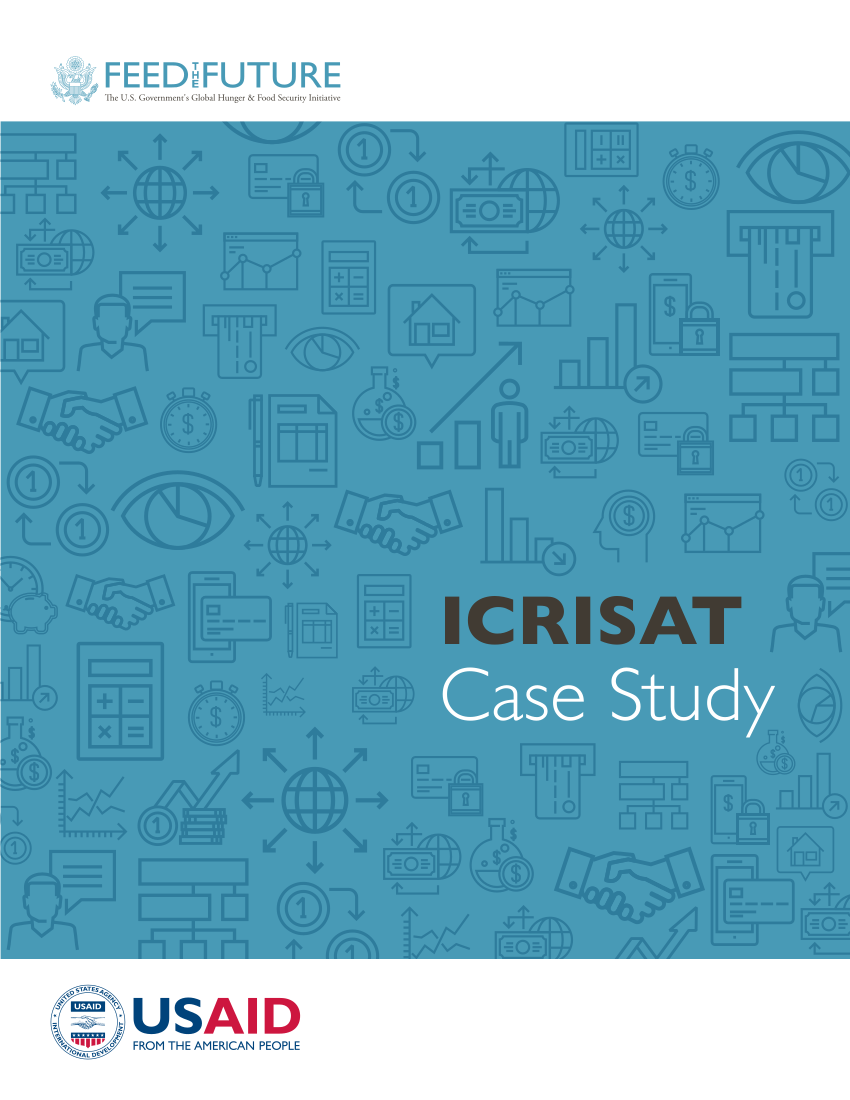- What We Do
- Agriculture and Food Security
- Democracy, Human Rights and Governance
- Economic Growth and Trade
- Education
- Environment and Global Climate Change
- Gender Equality and Women's Empowerment
- Global Health
- Humanitarian Assistance
- Transformation at USAID
- Water and Sanitation
- Working in Crises and Conflict
- U.S. Global Development Lab
Speeches Shim
![]() (3 MB) ICRISAT Case Study
(3 MB) ICRISAT Case Study
This case study describes the digital agriculture work led by the International Crops Research Institute for the Semi-Arid Tropics (ICRISAT), a CGIAR center based in Hyderabad, India. It is part of a series highlighting the integration of digital technologies into agricultural programs. Each case study examines different approaches to adoption and how digital tools impact organizational culture, operations, and programs.
ICRISAT first began integrating digital tools into its research programs around 2009, but in 2014 digital agriculture became a critical component of the organization’s mission to achieve scalable, sustainable, and equitable impact on the lives of smallholder farmers. ICRISAT launched a Digital Agriculture research theme and is now weaving digital tools across the organization’s research and implementation work. The need to achieve rapid and scalable impact for smallholders drives ICRISAT’s approach. Each individual digital tool makes targeted gains to advance research or improve service delivery, and together they are ushering in a new digital era for agriculture in which ICRISAT and its partners can deliver “better, faster, and cheaper” technologies and services to empower smallholder farmers. ICRISAT uses digital agriculture interventions to:
Better serve farmers with digital tools that enable stronger connections between value chain actors and accelerate the transfer of research outputs and technologies to farmers. The Sowing App and Intelligent Agricultural Systems Advisory Tool (ISAT) deliver targeted and timely SMS messages to farmers about farm management practices, grounded in research, and the Plantix app helps extension officers automatically diagnose and respond to diseases and pests.
Forge impactful partnerships with a range of stakeholders who bring cutting-edge technology to agricultural research, extend ICRISAT’s reach, and strengthen agricultural value chains. ICRISAT’s approach in India involves working with state governments, local NGOs, CGIAR research programs, and technology innovators to achieve better development outcomes for farmers using digital tools. The iHub incubator connects technology innovators with ICRISAT researchers to catalyze innovations that can change agricultural research and the lives of farmers.
Improve the efficiency of work by improving the accuracy, timeliness, and cost of conducting research and of delivering agricultural research outputs to farmers, extension officers, the government, and other agricultural value chain actors. The LeasyScan allows researchers to rapidly measure leaf surface area and water stress and the HarvestMaster records highly accurate measurements of grain weight and moisture characteristics for development of new varieties.
Digital agriculture advances agricultural outcomes by driving more precise agriculture, better data collection and analytics, and more effective information dissemination. Although the organization’s early successes with digital agriculture date back to 2009, the current wave of digital agriculture interventions will show significant impact in the coming years. The building blocks are in place and there is already evidence that ICRISAT’s work leads to impacts that contribute to these outcomes in three ways:
- Providing better information and services to more farmers. A better understanding of soil, forecasts, and climate variability helps farmers make decisions about what crops to cultivate and what practices to adopt. Several digital interventions are providing farmers with better information for decision-making. Farmers who follows Sowing App advisories improved yields by an average of 30% and those who followed ISAT messages experienced up to 20% higher incomes. Many of ICRISAT’s tools and approaches like the Sowing App and Plantix have been institutionalized into state government initiatives and are being scaled up across southern India.
- Strengthening connections between actors. Digital agriculture interventions are closing gaps and strengthening connections between actors in agricultural value chains. The iHub itself plays a critical role in strengthening connections by encouraging technology start-ups to reconceive their products for the agriculture sector. Digital tools like Plantix and Kalgudi are creating two-way information flows between researchers and farmers and increasing transparency between actors.
- Transforming agricultural research for development. Digital integration improves efficiency, accuracy, and traceability in research and implementation. The LeasyScan and HarvestMaster increase the speed and volume of highly accurate measurements and reduce costs per unit. ICRISAT breeding programs can model that data to predict yields for different varieties and prioritize traits to breed for. The result is a product development pipeline that is more accurate, nimble, flexible, and responsive to the needs of ICRISAT’s clients. Digital agriculture is changing how scientists conduct research, and in the process unlocking opportunities to pursue new avenues of discovery.
Digital tools and approaches are becoming integral to how ICRISAT programs and their partners contribute to achieving the organizational mission. The case study provides further examples of the tools and approaches that are being piloted across the organization and how they will lead to increased impact. It concludes by highlighting valuable lessons for organizations wishing to pursue a similar digital integration.


Comment
Make a general inquiry or suggest an improvement.